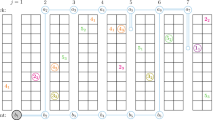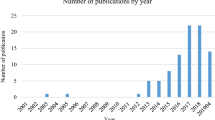Abstract
A scheduling problem commonly observed in the metal working industry has been studied in this research effort. A job shop equipped with one batch processing machine (BPM) and several unit-capacity machines has been considered. Given a set of jobs, their process routes, processing requirements, and size, the objective is to schedule the jobs such that the makespan is minimized. The BPM can process a batch of jobs as long as its capacity is not exceeded. The batch processing time is equal to the longest processing job in the batch. If no batches were to be formed, the scheduling problem under study reduces to the classical job shop problem with makespan objective, which is known to be nondeterministic polynomial time-hard. A network representation of the problem using disjunctive and conjunctive arcs, and a simulated annealing (SA) algorithm are proposed to solve the problem. The solution quality and run time of SA are compared with CPLEX, a commercial solver used to solve the mathematical formulation and with four dispatching rules. Experimental study clearly highlights the advantages, in terms of solution quality and run time, of using SA to solve large-scale problems.
Similar content being viewed by others
References
Pinedo M (2002) Scheduling theory, algorithms, and systems, Secondth edn. Prentice-Hall, Upper Saddle River
Mason SJ, Fowler JW (2000) Maximizing delivery performance in semiconductor wafer fabrication facilities. Simul Conf Proc 2:1458–1463, o.2
Mason SJ, Fowler JW, Carlyle WM, Montgomery DC (2005) Heuristics for minimizing total weighted tardiness in complex job shops. Int J Prod Res 43(10):1943–1963
Gupta AK, Sivakumar AI (2006) Job shop scheduling techniques in semiconductor manufacturing. Int J Adv Manuf Technol 27(11–12):1163–1169
Ovacik IM, Uzsoy R (1997) Decomposition methods for complex factory scheduling problems. Kluwer, Boston
Fang L, Luh PB, Chen H (2000) Improving the Lagrangian relaxation approach for large job-shop scheduling. 39th IEEE Conference on Decision and Control; Dec 12–15 2000; Sydney, NSW: Institute of Electrical and Electronics Engineers Inc.
Mason SJ, Fowler JW, Carlyle WM (2002) A modified shifting bottleneck heuristic for minimizing total weighted tardiness in complex job shops. J Sched 5(3):247–262
Mönch L, Driessel R (2005) A distributed shifting bottleneck heuristic for complex job shops. Comput Ind Eng 49(3):363–380
Uzsoy R, Wang CS (1997) Decomposition procedures for global scheduling of complex job shops. Proceedings of the 1997 21st IEEE/CPMT International Electronics Manufacturing Technology (IEMT) Symposium; Oct 13–15 1997; Austin, TX, USA: IEEE, Piscataway, NJ, USA
Demirkol E, Mehta S, Uzsoy R (1997) A computational study of shifting bottleneck procedures for shop scheduling problems. J Heuristics 3(2):111–137
Uzsoy R, Wang CS (2000) Performance of decomposition procedures for job shop scheduling problems with bottleneck machines. Int J Prod Res 38(6):1271–1286
Sun T, Luh PB, Liu M (2006) Lagrangian relaxation for complex job shop scheduling. Proceedings of the 2006 IEEE International Conference on Robotics and Automation, ICRA 2006; May 15–19 2006; Orlando, FL, USA: Institute of Electrical and Electronics Engineers Inc., Piscataway, NJ 08855–1331, USA
Kaskavelis CA, Caramanis MC (1998) Efficient Lagrangian relaxation algorithms for industry size job-shop scheduling problems. IIE Trans (Inst Ind Eng) 30(11):1085–1097
Pfund ME, Balasubramanian H, Fowler JW, Mason SJ, Rose O (2008) A multi-criteria approach for scheduling semiconductor wafer fabrication facilities. J SCHED 11(1):29–47
Damodaran P and Rojas M (2011). Mathematical formulation to minimize makespan in a job shop with a batch processing machine. Ninth LACCEI Latin American and Caribbean Conference (LACCEI'2011), Engineering for a Smart Planet. http://www.laccei.org/LACCEI2011-Medellin/…/PE166_Rojas.pdf. Accessed 25 Jan 2012
Kirkpatrick S, Gelatt CD, Vecchi MP (1983) Optimization by simulated annealing. Science 220:671–680
Cerny V (1985) A thermodynamical approach to the traveling salesman problem: an efficient simulation algorithm. J Optim Theory Appl 45:41–51
Yamada T, Nakano R (1996) Job shop scheduling by simulated annealing combined with deterministic local search, meta-heuristics: theory and applications. Kluwer, MA, pp 237–248
Fattahi P, Mehrabad MS, Jolai F (2007) Mathematical modeling and heuristic approaches to flexible job shop scheduling problems. J Intell Manuf 18(3):331–342
Chung SH, Tai YT, Pearn WL (2008) Minimising makespan on parallel batch processing machines with non-identical ready time and arbitrary job sizes. Int J Prod Res. doi:10.1080/00207540802010807
Yao AC (1980) New algorithms for bin packing. J ACM 27(2):207–227
Askin R, Standridge C (1993) Modeling and analysis of manufacturing systems. Wiley, New York, 451 p
Beasley JE (1990). Set of 82 JSP test instances. OR-library: http://people.brunel.ac.uk/~mastjjb/jeb/orlib/files/jobshop1.txt. Accessed 30 June 2009
Panwalkar SS, Iskander W (1977) A survey of scheduling rules. Oper Res 25:45–61
Author information
Authors and Affiliations
Corresponding author
Rights and permissions
About this article
Cite this article
Rojas-Santiago, M., Damodaran, P., Muthuswamy, S. et al. Makespan minimization in a job shop with a BPM using simulated annealing. Int J Adv Manuf Technol 68, 2383–2391 (2013). https://doi.org/10.1007/s00170-013-4858-4
Received:
Accepted:
Published:
Issue Date:
DOI: https://doi.org/10.1007/s00170-013-4858-4




